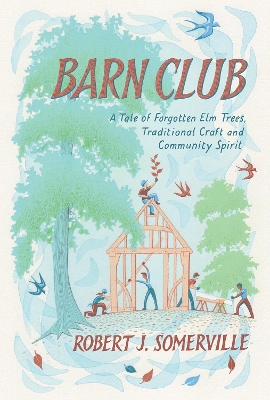Reviewed by annieb123 on
Barn Club is a story of community, continuity, tradition, and craft by Robert J. Somerville. Due out 11th March 2021 from Chelsea Green Publishing, it's 272 pages and will be available in hardcover and ebook formats.
More and more in the last decades has -all- of the emphasis been on producing more in less time. Efficiency studies are a multi-billion dollar industry to train people how to work "smarter" not "harder". If there's been one positive thing from the pandemic, it's being forced to slow down and become more connected to our own slower rhythm. Many of my circle of friends have picked up knitting needles, planted gardens, learnt embroidery, learnt to cook from scratch, and other traditional handcrafts. It's deeply satisfying to feel a connection with countless generations who have gone before us.
In this philosophical and reasoned narrative the author, who is a woodworker, gathers together a group of volunteers to raise a barn using traditional timber framing methods which have been nearly vanished for 150 years. He delineates the process alongside the philosophical, musing on the fate of millions of elm trees in the 70s and their gradual resurgence. He discusses the processes of design and construction which they used, and how the project and process came together.
The narrative throughout is enhanced by the inclusion of simple hand drawn line illustrations which show different construction details and small schematics.
Five stars. This is a different, relevant, and philosophically appealing book. It is in absolutely no way a "how to" or tutorial guide. I highly recommend it to readers of natural history, philosophy, traditional lifestyle, self sufficiency, homesteading, and allied genres.
Disclosure: I received an ARC at no cost from the author/publisher for review purposes.
Reading updates
- Started reading
- 7 March, 2021: Finished reading
- 7 March, 2021: Reviewed
